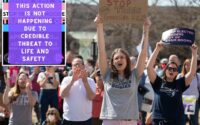Turkey and Syria earthquake death toll rises, rescues dwindle
Rescuers on Friday miraculously continued finding survivors from the earthquake that killed more than 21,500 people — including a family of six that survived in a pocket of air inside a collapsed Turkish high rise for 101 hours.
Dramatic images showed jubilant emergency crews rushing the Oktay family from the rubble of a building near Turkey’s border with Syria that was completely razed by Monday’s 7.8 magnitude earthquake.
Mom Yasemin Oktay was photographed being surrounded by dozens of people as she was held aloft on a stretcher.
She survived with her husband and four kids by huddling together in a small pocket of air left within the collapsed high rise, according to one of the rescue workers, Murat Baygul.


Their high-rise building stands only 600 feet from the Mediterranean Sea, with the quake leaving streets flooded to within feet of the building.
After they were saved, crews continued to try to get to at least three other people seemingly located alive in the wreckage.
Also in Turkey’s Hatay province, a 10-month-old baby was filmed being gently pulled from the rubble of a collapsed building after 90 hours trapped alongside his mom, who was also saved.


The delicate newborn, Yagiz Ulas, was also shown wrapped in foil to keep it warm as the child was carried in an ambulance to a nearby hospital.
In Gaziantep, near the epicenter of the quake, a teen pulled from the wreckage after 94 hours said he’d been forced to drink his own urine to quench his thirst.
“I was able to survive that way,” Adnan Muhammed Korkut said.
Friends and relatives clapped and cried tears of joy as he was pulled out and put on a stretcher, with his mom among those bending down to hug and kiss him as the crowd chanted, “Adnan.”
“Thank God you arrived,” he told rescuers, many of whom also hugged him.
One, identified only as Yasemin, told the rescued teen: “I have a son just like you … I swear to you, I have not slept for four days. I swear I did not sleep; I was trying to get you out.”
In Kahramanmaras, two teenage sisters were rescued after spending 99 and 101 hours under rubble in the Turkish city.

Footage posted on February 10 showed Ayfer, 15, being pulled out and carried on a stretcher away, followed two hours later by her 13-year-old sister, Fatma.
Dramatic rescues were reported elsewhere, including in the city of Antakya, where crews saved a 10-year-old girl overnight and on Friday.
The rescues gave unexpected glimmers of hope from what now ranks as the seventh most deadly natural disaster of the century, surpassing the 17,000 killed in 1999 from a similar quake in Turkey.
Turkey’s disaster management agency said 18,342 people had been confirmed dead in the disaster so far in Turkey, with nearly 75,000 injured.
More than 3,300 have been confirmed dead on the other side of the border in war-torn Syria, bringing the total number of dead to more than 21,600.
The devastation has left morgues and cemeteries overwhelmed, with bodies left wrapped in blankets, rugs, and tarps in the streets of some cities.
Temperatures remain below freezing across the large region, and many people have no place to shelter. The government has distributed millions of hot meals, as well as tents and blankets, but was still struggling to reach many people in need.

Mustafa Turan rushed to his hometown of Adiyaman from Istanbul hours after the quake struck to check on his relatives. He counted 248 collapsed buildings between the airport and the city center.
The journalist said Friday that 15 of his relatives had been killed, and scores of people were sleeping outside or in tents.

“At night, about 4 a.m., it got so cold that our drinking water froze,” he said.
Engineers suggested that the scale of the devastation is partly explained by lax enforcement of building codes, which some have warned for years would make them vulnerable to earthquakes.
The problem has been largely ignored, experts said, because addressing it would be expensive, unpopular, and restrain a key engine of the country’s economic growth.

Aerial footage from over the earthquake zone in Turkey revealed entire neighborhoods of high-rises reduced to twisted metal, pulverized concrete, and exposed wires.
Even though experts say trapped people could survive for a week or more, the chances of finding survivors in the freezing temperatures are dimming.
As emergency crews and panicked relatives dug through the rubble — and occasionally found people alive — the focus began to shift to demolishing dangerously unstable structures.

In Kahramanmaras, the city closest to the epicenter, a sports hall the size of a basketball court served as a makeshift morgue to accommodate and identify bodies.
In northwestern Syria, the first U.N. aid trucks since the quake to enter the rebel-controlled area from Turkey arrived Thursday, underscoring the difficulty of getting help to people there.
Meanwhile, Syrian President Bashar Assad made his first public appearance Friday in an earthquake-devastated area of the country since the disaster.


Assad and his wife, Asmaa, visited wounded patients at the Aleppo University Hospital, Syrian state media said.
Turkey’s disaster-management agency said more than 120,000 rescue personnel were now taking part in the effort and more than 12,000 vehicles, including tractors, cranes, bulldozers and excavators had been shipped.
The Foreign Ministry said 95 countries have offered help, and already nearly 7,000 rescue personnel from 60 countries were on the ground. Another 19 countries were expected to send teams, the ministry said.
With Post wires








